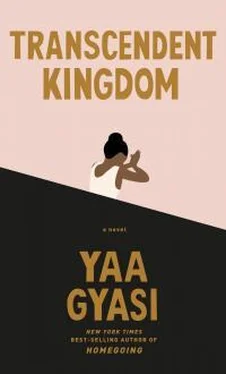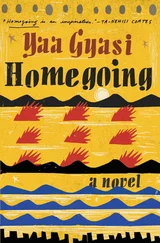Where was Pastor John in all of this? He and his wife sent flowers to our house that first week. He came by after church the third Sunday, the only three Sundays since joining the First Assemblies that my mother had missed a service. I answered the door, and the first thing he did was put his hand on my shoulder and start praying.
“Lord, I ask that you cover this young lady with your blessings. I ask that you remind her that you are near, that you walk with her as she walks through her grief.”
I wanted to shrug his arm away, but I was so grateful to see him, so grateful for his, for anyone’s, touch that I stood there and I received.
He came into the house. My mother was in the living room, and Pastor John went to her, sat down beside her on our couch. He put his hands on her shoulders, and she crumpled. It looked as intimate to me as nakedness, and so I left the room, giving them space to be with each other and with the Lord. Though I have not always loved Pastor John, I loved him dearly the day that he finally showed up. He has stayed in my life and my mother’s life ever since.
—
I never told my mother that I hated the funeral cloth. I wore mine, and my mother wore hers, and the two of us welcomed the guests to the clubhouse my mother had rented for Nana’s funeral. Ghanaians came—from Alabama and Tennessee and Ohio and Illinois. And in Ghana, at the funeral that the Chin Chin Man threw, Ghanaians came—from Cape Coast and Mampong and Accra and Takoradi.
My mother paced up and down the room, singing:
Ohunu mu nni me dua bi na mas ɔ mu
Nsuo ayiri me oo, na otwafo ɔ ne hwan?
There is no branch which I could grasp
I am in swamped waters, where is my savior?
I didn’t know the song, and even if I had, I’m not sure I would have joined in. I sat in the front row with the handful of other Ghanaians worthy of the receiving line and shook hands with all the mourners who passed through. As their hands gripped mine, all I could think about was how desperate I was to wash away each touch, to turn the faucet to scalding heat, to get clean, get rid.
We were at the Elks Lodge, the only facility large enough to hold the extravagant funeral my mother wanted to throw. But the Elks Lodge was no Kumasi funeral tent, and though we had invited everyone from Nana’s basketball team, his old soccer teams, everyone from the church, the entirety of the little world my mother had managed to build in fifteen years, the space was still only half full.
My mother kept pacing and singing her song:
Pray ԑ e, mene womma oo
Ena e, akamenkoa oo
Agya e, ahia me oo
What will become of us
I am left alone
I am impoverished
The Ghanaians wept and paced, threw up their hands and questioned God. The Americans stood, baffled.
Before long, Pastor John took the microphone and went up to the makeshift pulpit at the front of the room in order to say a word.
“We know that Nana was a talented young man. Many of us in this room saw him on the basketball court, shooting that basketball toward the Heavens themselves. It brought us joy to watch him and to recognize in this young man the glory of the Lord. Now whenever a young person dies, it’s easy for those of us who were left behind to get angry. We think, why would God do this? Nana had so much to give, God, why? It’s normal to feel that way, but let me remind you, God doesn’t make mistakes. I said, God doesn’t make mistakes. Amen? God in his infinite wisdom saw fit to bring Nana home to him, and we have to believe that the Heaven where Nana is now is so much more wonderful than anything this world had to offer him. Nana is in a better place, with our Heavenly Father, and one day we will have the great joy, the great, great joy, of meeting him there.”
I sat there listening to Pastor John’s words, listening to the amens and hallelujahs that rose up in chorus around those words, thinking, Nana would have hated all of this. And that knowledge, and that roomful of people who knew my brother but didn’t know him, who skirted around the circumstances of his death, talking about him as though only the portion of his life that had taken place before his addiction was worthy of examination and compassion, wrecked me and felled the long-growing tree of my belief. I sat there in that lodge, reduced to a stump, wondering what would become of me.
39
The Chin Chin Man had sent us pictures of Nana’s Ghanaian funeral. There were hundreds of people gathered in a tent in Kumasi, wearing clothes similar to the ones my mother and I had worn. My father was in only one of the photos. He looked stately in his black-and-red wrapper. His face was an old, faded memory. I had never looked like him, but, staring at the photo, I could see myself in his bent head, his sad eyes.
“They had a good turnout,” my mother said as she flipped through the photos. “Your father did well.”
I didn’t know any of the other people pictured. Most of them hadn’t known Nana, but a few said that they could remember the baby he once was.
When the Chin Chin Man called to ask if we had received the photos, I talked to him for a few minutes.
“What did you tell everyone?” I asked him.
“What do you mean?”
“About how Nana died. What did you tell them? What did you tell your wife?”
He paused and I looked at the photo of him, waiting for an answer. “I said he was sick. I said he was sick. Is that not true?”
I didn’t even hand the phone to my mother. I just hung up. I knew she would call him back and that the two of them would whisper about me before they went over every detail about the funeral. What was eaten, what songs were played, what dances danced.
“I don’t like how you disrespected your father,” my mother said later that day. She hadn’t gone to work in two weeks, and it was strange for me to see her in the house at every hour, doing everyday things, coming to my room to dispense a parenting reproach an American child might get on television. In those first few weeks after Nana died, before my mother’s crash, I’d felt as though I was living the same life, but upside down, backward. Things looked normal to the untrained eye, but when had my mother ever been home, awake, talking to me at three in the afternoon?
“Sorry,” I said.
“They had a good turnout at the funeral,” she said.
“You already said that.”
She glared at me in warning and I remembered myself. Things hadn’t gotten so backward that I could become a regular American preteen girl, mouthing off to her mother.
“Do you wish you could have been there?” I asked, changing course.
“In Ghana? No. Nana would not have wanted that.”
She stood there leaning against my doorframe for a little while longer. In those days, and still, I was always wondering how to be with her. Should I have gotten up and forced her into a hug? She told me she was going to take an Ambien. She left the room, and I could hear her rustling around the bathroom searching for the sleeping pills she’d come to rely on to survive her many years of working the night shift. I could hear her get into bed. Little did I know.
—
The Ambien made my mother loopy and mean. She would take one, but she wouldn’t fall asleep right away. Instead she would wander around the house, looking for trouble. Once, she found me in the kitchen making myself a peanut butter sandwich and she said, “You know I didn’t want another child after Nana.” On Ambien, her words were always slow, slurred, like each one was dipped in the shocked sleep of that drug before it escaped her lips.
“I only wanted Nana,” she said, “and now I only have you.”
Читать дальше












